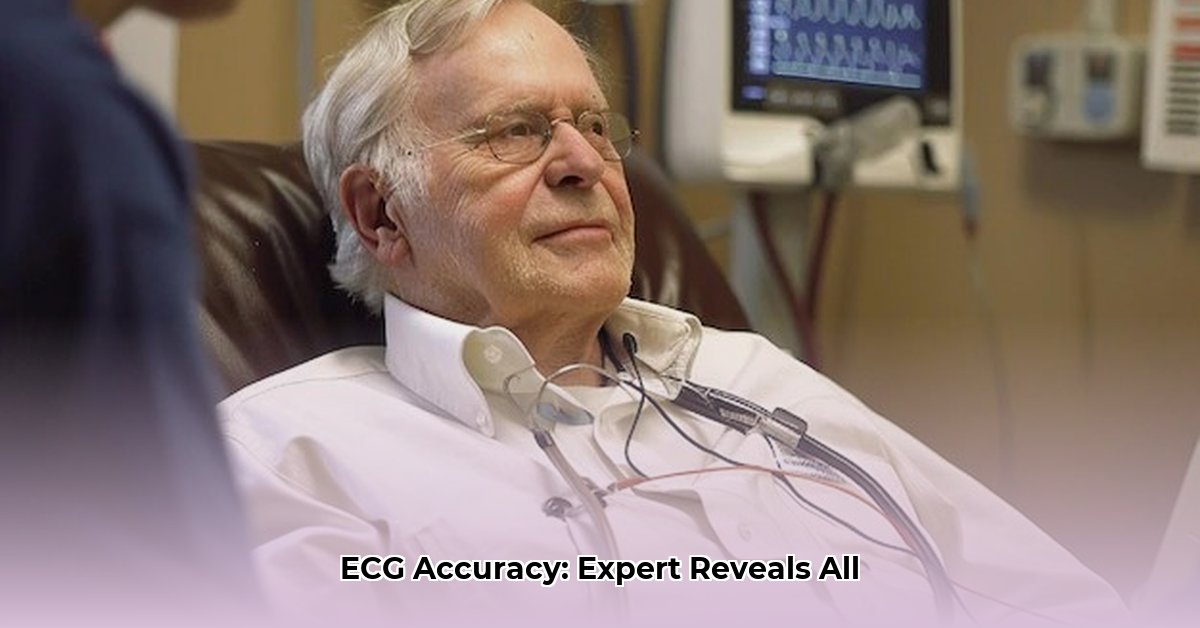Ever wondered about the reliability of that heart tracing? This article delves into the accuracy of ECG (electrocardiogram) tests, offering expert insights and exploring the impact of new technologies. We’ll break down how ECGs work in simple terms, examine the factors influencing their precision, and discuss the latest advancements. Whether you’re a healthcare professional or simply seeking a better understanding of your heart health, this comprehensive guide will provide a clearer picture of this vital diagnostic tool. For more information on interpreting results, see [borderline ECG results](https://www.mearnes.com/what-to-do-after-a-borderline-ecg).
Decoding ECG Accuracy: An In-Depth Analysis
An electrocardiogram (ECG) is a cornerstone of modern cardiology, providing invaluable insights into heart health. But how accurate is an ECG? The answer is multifaceted, prompting questions from both patients and healthcare providers. Let’s embark on a journey into the world of ECGs, examining their capabilities, limitations, and the evolving landscape of cardiovascular diagnostics.
Understanding ECG Basics: Visualizing Your Heart’s Electrical Symphony
Think of your heart as an intricate electrical system, orchestrating each beat with precision. An ECG acts as a sophisticated recording device, capturing the electrical signals that govern your heart’s rhythm and function. This non-invasive test provides a “snapshot” of your heart’s electrical activity, allowing doctors to identify irregularities, such as arrhythmias, signs of ischemia, or evidence of previous heart attacks. Understanding these principles is fundamental to appreciating the role of ECGs in cardiac monitoring.
Key Factors Influencing ECG Accuracy: A Holistic Perspective
The accuracy of an ECG depends on a confluence of factors. First and foremost, the quality and calibration of the equipment are paramount. A well-maintained ECG machine, using up-to-date technology, ensures reliable data acquisition.
Equally important is the precise placement of electrodes on the patient’s chest, arms, and legs. Even slight variations in electrode positioning can introduce artifacts and distort the readings, much like taking a photograph with a misaligned lens.
Patient-related factors also play a significant role. Excessive movement, muscle tremors, or even certain skin conditions can interfere with the electrical signals, compromising the accuracy of the ECG tracing.
Finally, the expertise and interpretive skills of the healthcare professional analyzing the ECG are crucial determinants of diagnostic accuracy in electrocardiogram interpretation.
The Human Element: Expertise and Interpretation in ECG Analysis
Does experience truly make a difference in ECG interpretation? The answer is a resounding yes.
Numerous studies have demonstrated significant differences in accuracy rates among healthcare professionals with varying levels of training and experience. Cardiologists, with their specialized knowledge of cardiac electrophysiology and pattern recognition, consistently outperform general practitioners and other non-specialists in ECG interpretation.
This highlights the critical need for standardized training programs, continuous medical education, and proficiency testing to ensure the reliability and consistency of ECG interpretations across the healthcare spectrum. Continuous learning directly impacts the validity of your ECG results.
Technological Advancements: Revolutionizing ECG Precision with AI
Artificial intelligence (AI) is transforming numerous fields, and ECG interpretation is no exception. Sophisticated AI algorithms, trained on vast datasets of ECG tracings, are capable of identifying subtle patterns and anomalies that might be missed by the human eye. These algorithms excel at detecting subtle ST-segment changes indicative of myocardial ischemia or identifying complex arrhythmias with greater speed and precision.
“AI algorithms possess the capacity to analyze ECG tracings with unparalleled speed and consistency, surpassing human capabilities in certain aspects,” research indicates.
However, concerns regarding algorithm bias, data security, and the potential for over-reliance on automated interpretations remain important considerations. AI should be viewed as a powerful tool to augment human expertise, not to replace it entirely. This synergy between human intellect and machine learning promises to enhance the accuracy and efficiency of ECG-based diagnoses.
Recognizing ECG Limitations: A Comprehensive Diagnostic Approach
Despite technological advancements, ECGs have inherent limitations. They may not detect subtle or intermittent heart problems, and they can sometimes produce false-positive results, leading to unnecessary further testing. Conditions such as atrial fibrillation detection can be challenging. For example, an ECG may appear normal between episodes of paroxysmal atrial fibrillation.
Therefore, ECGs should always be interpreted in the context of a patient’s clinical history, physical examination findings, and other relevant diagnostic tests. Doctors often use ECGs in conjunction with blood tests (cardiac enzymes), echocardiograms (heart ultrasounds), or stress tests to obtain a more complete picture of a patient’s heart health.
Improving ECG Test Accuracy: A Collaborative Effort
Enhancing ECG accuracy requires a multifaceted approach involving advancements in equipment technology, standardized procedures, rigorous training programs for healthcare professionals, and the judicious integration of AI-powered interpretation tools, ultimately bolstering the reliability of cardiac assessments.
Patient Involvement: Empowering Patients for Accurate ECG Results
As a patient, you play a vital role in ensuring the accuracy of your ECG. Here are some steps you can take:
- Proactive Communication: Openly discuss any heart health concerns, symptoms, or relevant medical history with your doctor or the ECG technician.
- Optimal Test Conditions: Ensure that the ECG is performed correctly, with proper electrode placement, minimal movement, and a relaxed state of mind.
- Seeking Clarification: Don’t hesitate to ask your doctor to explain your ECG results in a clear and understandable manner. Request clarification on any uncertainties or potential implications.
In conclusion, while ECGs are an indispensable tool for assessing heart health, it’s crucial to acknowledge their limitations and potential sources of error. A holistic approach, encompassing advanced technology, rigorous training, and transparent communication between doctors and patients, is essential for achieving accurate and effective cardiac assessments. The understanding of ECG accuracy is constantly evolving with ongoing research, making it a dynamic and impactful area of medicine.
- The TM Book Offers an Essential Guide to Meditation. - March 4, 2026
- Transcendental Meditation Books Guiding Your Journey to Deeper Practice - March 3, 2026
- Your TM Meditation Book Explores Its Benefits and History - March 2, 2026
















